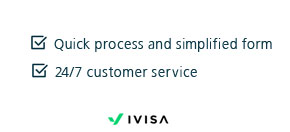As you may already know, most foreign travellers wishing to visit India are required to obtain a visa, regardless of the length of their stay or the purpose of their visit. There are only two exceptions to this visa requirement, which are for nationals of Bhutan and Nepal. But what if your trip has a final destination other than India and you are only transiting India? Generally speaking, a visa or residence permit will be required here to transit the country but in reality it will depend on the length of the transit or stopover and whether the traveller is leaving the transit area of the airport. Thus, some visitors are required to obtain a transit visa by applying for it in advance. For this purpose and as we will see below in detail, it is possible to use the online e-visa service to save time.
India transit visa: key points
- A transit visa is required for transits of more than 24 hours in India.
- The transit visa is also required if the traveller leaves the transit zone in India
- You can apply for a transit visa for India online
- It takes an average of 4 working days to obtain a transit visa for India.
→ India eVisa application for transit ←
Is a visa required for simple transit to India?
According to the Indian government's visa rules, all non-visa-exempt travellers transiting through an Indian airport for more than 24 hours, as well as travellers planning to leave the airport's transit zone for any length of time, are required to obtain a transit visa for India.
This means that the transit visa for India is a mandatory document if you have a stopover or transit of more than 24 hours between the time of arrival and departure. But it also means that travellers who have a connecting flight less than 24 hours after arrival in India but need or plan to leave the transit zone of the airport for some reason, also need a transit visa. For example, passengers may need to recheck their luggage to catch their connecting flight, or they may decide to stay overnight in a hotel outside the transit zone, or simply want to use the time in transit to visit the area around the airport.
It is therefore logical in this case that they need a transit visa for India and it is recommended that they apply for this in advance by applying for an eVisa online.
→ India eVisa application for transit ←
In what cases is a visa not required for transit through India?
In some very specific cases, a transit visa will not be required for a transit or stopover in India. For example, you can transit through an Indian airport to another destination if :
- You have a ticket to another destination in another country.
- Your stopover or transit in India is less than 24 hours.
- You will not leave the airport transit area.
For travellers whose transit time is less than 24 hours, it is recommended that they book the connecting flight on the same ticket as the flight to India. This way, they will not have to leave the transit area to check their luggage again for the second flight and will not have to apply for and obtain a transit visa for India.
Another special case concerns people entering India by sea. They will not need a transit visa for India provided they remain on board the vessel when it docks at the Indian port.
Finally, you will not be required to apply for an India transit visa if you already hold a valid e-visa for India such as a tourist, business or medical visa, even for a transit of less than 24 hours with an exit from the transit zone. These types of e-visas are multiple entry visas and therefore allow multiple stays, transits or stopovers in India during the entire validity period. However, please ensure that the passport number associated with this visa is always the same as the passport you are using for this trip.
When should I apply for a transit visa for India and how long does it take?
If you are lucky enough to be one of the travellers eligible for an e-visa for India, which is the case for French nationals but also for all nationals of European Union countries, you can fill in a simple e-visa form online through the official website or through a service provider website like the one we recommend here. This procedure will only take a few minutes and all you need to do is fill in your personal details, your passport details and answer a few questions.
When you fill in this online application, you will be asked to fill in the type of visa you wish to obtain. In this case, you will need to apply for a transit visa for India. It will also be mandatory to mention the date you plan to arrive and the point of entry into India.
Once you have filled in the form, you will only need to pay the visa fee with your credit or debit card directly online to finalise your application.
Once your application is submitted, it is usually processed within 4 working days. It is therefore recommended that you apply at least 4 days or even a week before your departure date to ensure that you obtain this authorisation in time.
When the transit visa is accepted, it is sent directly by email to the applicant at the address given in the form. The applicant must then print the form and present it to the border officials when boarding and transiting India.
It should also be remembered that a transit visa is valid for two entries. This means that you can use it for both your outward and return transit. It is a document valid for 15 days from the date of issue. The transit visa only allows you to transit through India for a maximum of 3 days and only for direct transit. If you wish to stay longer than 3 days in India, you will need to apply for another type of visa depending on the purpose of your trip.
→ India eVisa application for transit ←
How much does a transit visa for India cost?
The price of an India transit visa depends on several factors, such as the nationality of the traveller, the length of validity of the visa and where the visa is issued. Prices are also subject to change due to exchange rate fluctuations and government policies.
In general, the cost of a transit visa for India varies between 10 and 100 euros. Citizens of some countries, such as Nepal and Bhutan, may be exempted from the transit visa fee. However, for citizens of countries that require a transit visa for India, the cost can vary considerably.
For example, the cost of a 24-hour transit visa for French citizens is currently 30 euros, while for a 96-hour transit visa, the cost is 40 euros. For US citizens, the cost of a 24-hour transit visa is $20, while for a 96-hour transit visa, the cost is $40.
It is important to note that the visa fee is non-refundable and does not guarantee a visa.
What is the alternative to a transit visa for India?
A transit visa is required for travellers transiting through India who have to leave the international zone of the airport, or if their stopover lasts more than 24 hours. However, if you wish to avoid the transit visa, there are several alternatives, depending on the length of the stopover and the nationality of the traveller.
The first alternative, for travellers with a stopover of less than 24 hours, is to stay in the transit zone of the airport. In this case, no transit visa is required until you leave the transit zone and collect your baggage. Many major Indian airports, such as Delhi and Mumbai, offer comfortable facilities and services for transit passengers, making the wait more pleasant. However, this alternative will not be valid in other cases.
Another alternative is the electronic tourist visa (e-Visa), which may be more advantageous for people who wish to extend their stay or leave the airport to visit the city during a long stopover. The Indian e-Visa is easy to obtain online before departure, and allows a short stay in India (up to 60 days for tourism). This type of visa is available to citizens of many countries and can be issued in just a few days.
Finally, for travellers of certain nationalities, India has visa waiver agreements or facilities for obtaining visas on arrival, but this depends on the passenger's citizenship. These alternatives to the transit visa are more flexible and allow travellers to make the most of their stopover in India or avoid the need for a transit visa strictly linked to the time and conditions of the journey.
→ India eVisa application for transit ←
Adeline HARMANT
As a web writer and globetrotter with a passion for travel and tourism, I have acquired in-depth knowledge of the procedures that are essential for travellers. I help travellers to complete all the formalities required for a successful trip, particularly when it comes to obtaining a visa online. With several years' experience in this field, I'd like to offer you some valuable advice to help you discover the world with complete peace of mind.




